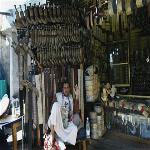
Officially, Yemen's economy is growing. Unofficially, the nation appears to be trapped in a disastrous downward economic spiral.
On the streets of Sana'a, anger over price hikes is growing almost as fast as the prices. In the past few months, the cost of wheat and sugar has more than doubled they say, and cooking gas, in constant short supply, can cost three times as much as it did a few months ago.
And while Yemen's Central Bank projects economic growth as high as eight percent in 2010, to average Yemenis, the idea that their country's economy is growing is laughable.
Price hikes
Ibrahim Musleh al-Farzay sells snacks, cigarettes, and canned food from his Sana'a shop. He says some items in his store have gone up as much as 50 percent in recent months. In the summer of 2005, price hikes in Yemen sparked riots that killed dozens of people, and injured hundreds. Two young men died in the chaos right outside his shop, al-Farzay says. If things do not get better soon, he thinks the riots will start again.
But even by modest accounts, Yemen's economy is growing. Oil exports fill about 70 percent of the government's coffers. And although known oil supplies are drying up, Yemen has begun exporting liquefied natural gas. The project, worth more than $4 billion over five years, is hailed by the government as an economic savior.
But Yemeni economists say that energy revenue alone will not help average people. Sana'a University Economics Professor Taha al-Fusail says the energy sector may be a lifeline, but Yemen needs to diversify its economy if it wants to grow in a way that will fund the government and feed the people.
"But I think also we should consider agriculture, fishing, manufacturing also, which has sustainability for the economy. Unfortunately we did not benefit from the oil or the gas," he said.
Al-Fusail says the price-hikes are a result of the devaluation of the local currency. The Yemeni riyal has lost 20 percent of its value against the dollar in recent months. Diversifying the economy, he says, would also help the country produce more and buy less, reducing the impact of the sinking value of Yemeni money. At the moment, Yemen imports most of what it consumes.
Extreme poverty
And as the cost of everything goes up, extreme poverty in Yemen becomes more prevalent. Millions of people can barely find enough to keep themselves alive and unemployment is reported as high as 40 percent. In a country where half the people live on less than $2 a day, locals crowd desolate refugee camps, trying to get in. The camps, which are meant to house only people fleeing wars, at least have some food and shelter.
And while international aid to combat terrorism in Yemen has increased in recent months, humanitarian agencies say they are running out of money. Yemeni officials say the international funding is not nearly enough to combat poverty, which they say is the real security threat in Yemen.
Terror threat
But the threat of terrorism, according to former Yemeni prime minister Abdul Karim al-Iryani, is equally part of the downward economic spiral causing anger on the streets of Sana'a.
"Investment is very, very limited because of the security situation," he said. "Tourism is almost zero. Some hotels are closed. Economic growth, it is a prediction, but I think it is far fetched that it will grow at eight percent."
As Yemen battles al-Qaida in the Arabian Peninsula, a Southern separatist movement, and tries to wrap up a six-year old war in the north, Western governments warn their citizens to stay out of the country, scaring off tourists and investors. Al-Iryani says the warnings are harming his country, and that Yemen's major cities and almost all its roads are safely controlled by the central government.
But he says for this year Yemen's economic prospects are poor, and the country would be lucky to grow at half the rate the Central Bank has projected. If it grows at four percent, he says, that would be a "bonanza."
'Cleaning-climbers' promote green tourism in Yemen
Al-Qaida group in Yemen reaches out to Somali rebels
Child brides in Yemen seek legal protection
Yemen opposes foreign base on its soil
(来源:VOA 编辑:陈丹妮)
